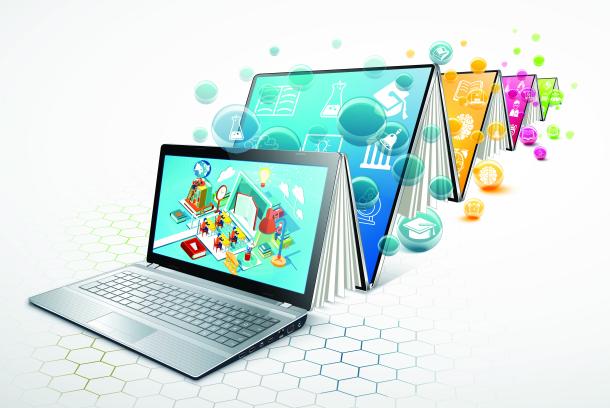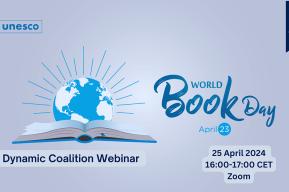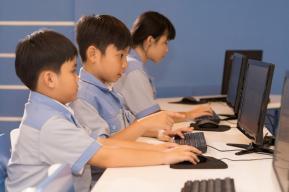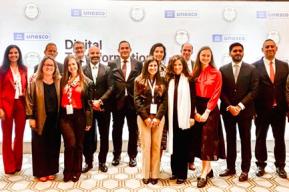News
Spotlight on Open Educational Resources at Transforming Education Summit

Two concurrent events were held during the Solutions Day on the UNESCO OER Recommendation sponsored by Finland, Germany, Ghana, Ireland, Nigeria and South Africa and institutions including Creative Commons, IAU, IFLA Mission 4.7, SDS Net-SDG Academy, UN Academic Impact, UNESCO, UNICEF, UN Library, McLuhan Foundation, Centre for Nordic Media Research (Nordicom), and 2U in the following topics:
- Effective Educational Ecosystems: Solutions for Open Digital Content
- Transforming Education for Sustainable Development (ESD) - implementing the UNESCO OER Recommendation within Multi-Stakeholder Partnerships
The focus on the OER Recommendation at this UN high-level event stressed how OER digital platforms and ecosystems are crucial in building robust mechanism to deliver educational digital transformation, quality and capacity building and empower learners and teachers with OER.
To transform education, we need to think about why, who and how? OER is part of the ‘how’ as well as cutting-edge digital platforms in that it has great potential to transform knowledge and create added value for learners.
In the past, technology has enhanced inequalities in education, but now we have the power to reverse that trend. In this regards, digital innovation is a game changer. OER need to be accessible online and offline through apps, small screens and platforms, in national and local languages.
A main message of the first session is that OER are Digital Public Goods and thus digital teaching and learning resources should be both openly licensed and free of cost. In this regard, to build open digital platforms, governments need to harness the only UN Normative Instrument, the UNESCO Recommendation on OER 2019.
The different sessions showed strong testimonies from Finland, Germany, Ghana, Greece, Mongolia and Nigeria on how OER are making a great impact in access and quality education, make it available free of charge and globally changing the education landscape.
When educational resources are shared it is not only about materials, but also about improving pedagogical thinking and boosting professional development of those who prepare, adapt and use such materials. It is important, therefore, to ensure that digital infrastructures empower teachers, learners and schools to connect with each other.
The second side event highlighted how stakeholder partnerships on using digital Diamond Open Education Resources Repositories to scale up Education for Sustainable Development and professional training, are key and timely at a time when Member States are exploring how to roll out inclusive digital learning platforms and open content.
Furthermore, the session highlighted the importance of creating Diamond OERs that are hosted in Findable, Accessible, Interoperable and Reusable (FAIR) Open Educational Resources Repositories (OERRs) that can be used in ESD and training at any stage of life, in any corner of the planet.
The main objectives were to showcase how the stakeholder partnership can implement the UNESCO Open Education Resource (OER) Recommendation using transformative digital Diamond Open Education Resources Repositories (OERRs) to scale up Education for Sustainable Development (ESD) and professional training. Diamond Open Access is a large-scale initiative that includes governments, institutions, coalitions and the Private Sector that add unique value to a multi-stakeholder ‘Diamond’ partnership for an effective implementation of the OER Recommendation.
The two sessions highlighted the pioneering/avant-garde role of the UNESCO OER Recommendation, and UNESCO OER Dynamic Coalition in ensuring the ecosystem for inclusive quality digital public platforms.
These side events resulted in the following recommendations and commitments to address the challenges identified in Thematic Action Track 4, ’building and maintaining safe; robust, free, public, digital learning content and platforms’ of the Transforming Education Summit:
- OER and digital platforms are powerful solutions for transforming education, since they enable the expansion of access to quality, innovative, free, accessible educational resources in different languages, for teachers and learners. To achieve this objective, it is vital to put in place robust mechanisms for OER capacity building, policy development, quality assurance, accessibility and sustainability for educational stakeholders
- Leverage the UNESCO 2019 OER Recommendation by using it as a theoretical foundation/ conceptual framework and integrating it into any public digital ecosystem/platform and its five areas of action.
- International collaboration including national efforts and grassroots collaboration at national and international level in terms of content, capacities and infrastructure are critical if we want to build capacities, robust content infrastructures and boost the production of OER. In this regard, the OER Dynamic Coalition including a global community of practitioners stand ready to support governments and other stakeholders in driving OER adoption forward.
- it is important to create national OER platforms/ecosystem as experience of countries like Mongolia, Finland that had national platforms/repositories of OER showed more resilience in education delivery during COVID 19 with less disruption”
- Commitments in planning and investments in curriculum development, Diamond FAIR OERRs and ESD education/ training were announced by each partner.
Background
The OER Dynamic Coalition was established further to the adoption of the UNESCO OER Recommendation by Member States at the 40th Session of the UNESCO General Conference in November 2019. The objective of the Dynamic Coalition is to support governments in implementing the OER Recommendation by promoting and reinforcing international and regional cooperation among all stakeholders in the first four areas of the UNESCO OER Recommendation.
The UNESCO ICT Competency Framework for Teachers (ICT-CFT) OER Network was created in 2013 to support Member States' efforts in ICT teacher training by contextualizing the ICT Competency Framework. It aims to support the realisation of national objectives related to ICT in education, develop teacher training materials based on OER, and implement teacher training exercises based on these materials.








